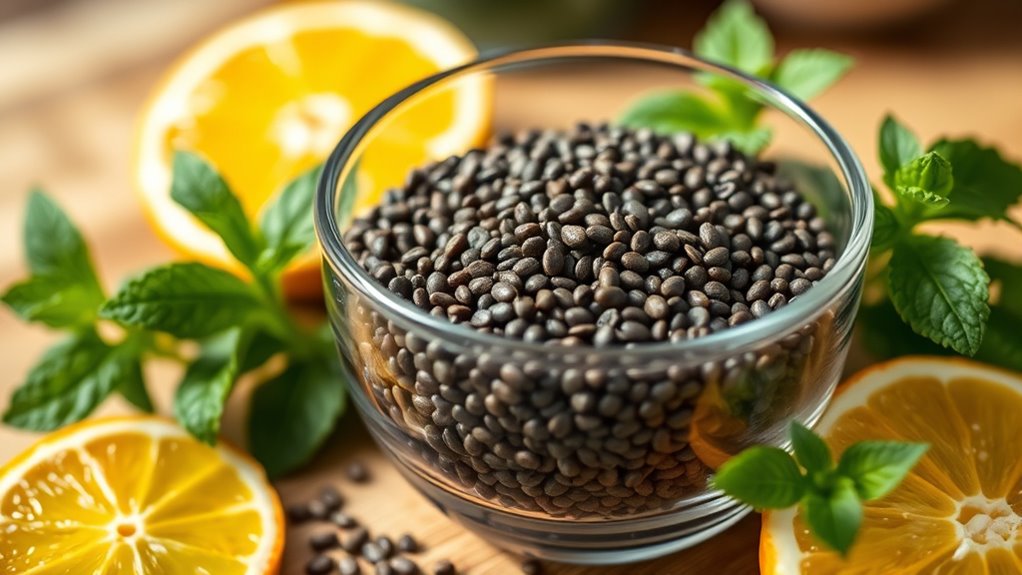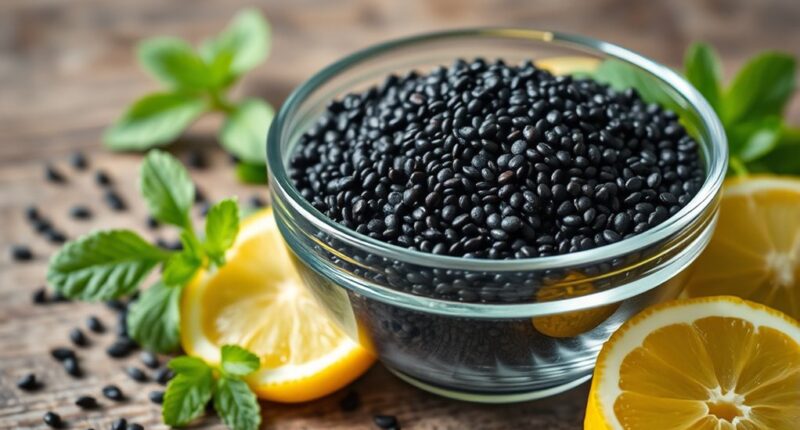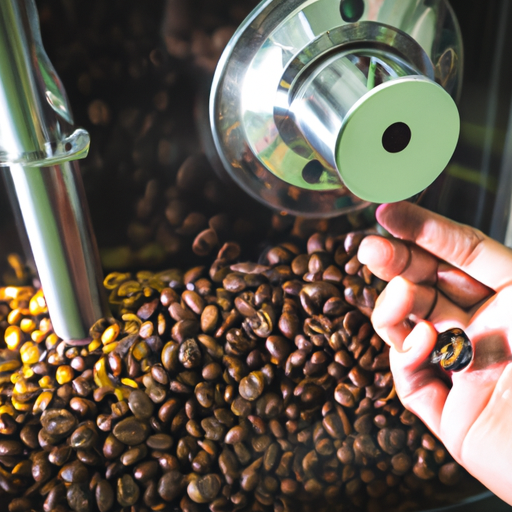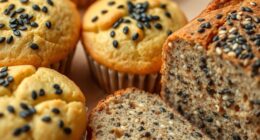Chia seeds can influence your serotonin production indirectly by supporting your gut health. They are rich in soluble fiber, acting as prebiotics that nourish beneficial gut bacteria. A healthy, diverse microbiome helps produce serotonin in your gut, which influences your mood and mental health. Plus, their omega-3 fatty acids have anti-inflammatory benefits that support brain function. If you want to discover how these tiny seeds can boost your overall well-being, keep exploring this fascinating connection.
Key Takeaways
- Chia seeds are rich in soluble fiber, serving as prebiotics that nourish beneficial gut bacteria involved in serotonin synthesis.
- A diverse microbiome, supported by chia seeds, enhances the production of serotonin in the gut.
- Improved gut health from chia seed consumption can positively influence the brain-gut communication pathway.
- Omega-3 fatty acids in chia seeds help reduce inflammation, supporting a balanced microbiome and healthy serotonin levels.
- Overall, consuming chia seeds may indirectly boost serotonin production by promoting gut microbiome diversity and health.

Your gut and mind are more connected than you might realize, influencing each other in powerful ways. This link, known as the mind-gut connection, is grounded in the complex interactions between your brain and your digestive system. One key aspect of this relationship involves the microbiome—the trillions of bacteria living in your gut. The diversity of these microorganisms, or microbiome diversity, plays a pivotal role in regulating your mood, mental health, and overall well-being. When your microbiome is balanced and diverse, it can support healthy communication pathways between your gut and brain.
A significant way this connection manifests is through serotonin synthesis. Serotonin is often called the “feel-good” neurotransmitter because it influences happiness, mood stability, sleep, and even appetite. Interestingly, about 90% of the body’s serotonin is produced in the gut, primarily by specialized cells influenced by the microbiome. A diverse microbiome encourages proper serotonin production, as certain bacteria release precursors and metabolites that stimulate serotonin synthesis. Conversely, a less diverse microbiome, often resulting from poor diet, stress, or antibiotics, can impair this process, leading to mood disturbances and other health issues.
So, how do chia seeds fit into this picture? Chia seeds are rich in fiber, especially soluble fiber, which acts as a prebiotic. Prebiotics serve as food for beneficial gut bacteria, helping to enhance microbiome diversity. When you consume chia seeds regularly, you support the growth of good bacteria, which in turn can boost serotonin synthesis. This means that by nourishing your microbiome, you’re indirectly influencing your mood and mental health, thanks to the mind-gut connection.
Moreover, chia seeds contain omega-3 fatty acids, which have anti-inflammatory properties and are linked to improved brain function and mood regulation. These nutrients, combined with the prebiotic fiber, help create an environment in your gut that promotes a healthy, diverse microbiome. A thriving microbiome not only supports serotonin production but also reduces inflammation, which has been associated with depression and anxiety. Additionally, maintaining a balanced microbiome is essential for supporting overall mental health and resilience against stress.
In essence, by incorporating chia seeds into your diet, you’re not just adding a healthy food; you’re actively supporting the complex communication network between your gut and brain. This can lead to improved mood, better sleep, and overall mental well-being. The connection between microbiome diversity and serotonin synthesis highlights how essential your gut health is for your mental health. It emphasizes that taking care of your diet, including chia seeds, isn’t just about physical health—it’s about nurturing your mind as well.
Frequently Asked Questions
Can Chia Seeds Help Reduce Anxiety and Depression Symptoms?
You might wonder if chia seeds can help reduce anxiety and depression symptoms. While research is still emerging, their nutritional benefits—including omega-3 fatty acids, fiber, and antioxidants—support overall mental health. Including chia seeds in your diet could contribute to better mood regulation and stress management. Remember, they’re a valuable part of a balanced diet, but consult a healthcare professional for personalized advice on managing mental health concerns.
How Much Chia Seeds Should I Consume Daily for Gut Health?
Oh, the eternal quest for the perfect chia seed dose—because more is obviously better, right? You should aim for about 1 to 2 tablespoons daily, which offers a good portion size without overdoing it. This daily intake helps promote gut health, fiber, and omega-3s. Remember, moderation is key; too much can cause digestive discomfort. So, stick to this sweet spot for ideal benefits!
Do Chia Seeds Interfere With Any Medications?
Chia seeds generally don’t interfere with medications, but you should stay cautious about potential medication interactions. If you’re on blood thinners or blood pressure meds, consult your doctor since chia seeds are high in omega-3s and fiber, which could affect how your meds work. Also, consider allergy concerns; if you have a seed allergy, avoid chia seeds to prevent reactions. Always check with your healthcare provider before adding new foods.
Are There Any Side Effects of Eating Chia Seeds Regularly?
You might experience side effects from eating chia seeds regularly, especially if your fiber intake suddenly increases. Common issues include digestive discomfort, such as bloating, gas, or constipation, and allergy risks like skin rashes or swelling. To minimize these effects, start with small amounts, stay well-hydrated, and monitor your body’s response. If you notice adverse reactions, consult a healthcare professional to confirm chia seeds suit your diet.
Can Chia Seeds Improve Overall Gut Microbiome Diversity?
You might wonder if chia seeds can boost your gut microbiome diversity. Eating chia seeds regularly provides fiber that feeds beneficial gut bacteria, helping increase microbiome diversity. As your gut bacteria thrive, they support digestion and overall health. Incorporating chia seeds into your diet is a simple way to promote a healthier gut environment, potentially leading to better digestion and immune function through improved gut bacteria balance.
Conclusion
As you nourish your gut with chia seeds, imagine a delicate symphony within your body, each seed fueling harmony between your mind and gut. Feel the gentle ripple of serotonin flowing, brightening your mood like sunlight breaking through clouds. By embracing these tiny but mighty seeds, you’re nurturing a vibrant connection that can uplift your spirit and soothe your soul. Trust in this simple act—your gut and mind working together in beautiful, healthful unison.









